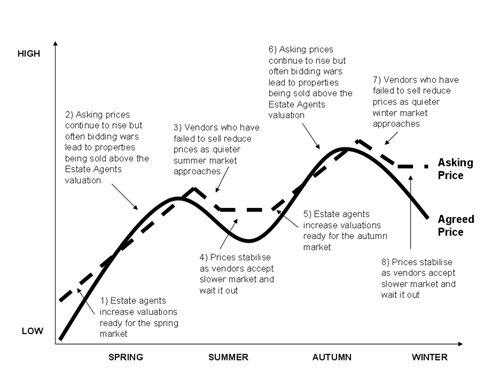Chapter 15: How to Really Make an Offer on a Property
This is an extract from the ebook How to Really Buy a Property.
What's covered in this chapter
- Why agents may push you to offer more even when it is of little financial benefit to them;
- What to offer and when;
- How the time of year will affect your offer;
- When to offer below, at or above the asking price;
- How to handle bidding wars and sealed bids;
- Why defining your offer can save you money;
- What should be in your offer apart from the price;
- How to make a low offer seem attractive to a vendor;
- Why non-refundable deposits rarely work.
Listening to the Estate Agent
If you have read everything in the previous chapters you will be pretty worldly wise as to how to pitch your offer. You will know to take into account if you are in a rising or falling market along with the motivations of the vendor and so there should be no need to repeat what has already been said. Many buyers suffer some paranoia about letting the agent know what their thoughts are. In a large part they are concerned that the agent will make them go to their absolute maximum budget and to the large part they are actually wrong.
To put it another way if the Estate Agent is being paid 2% of the sale fee and the negotiator is getting 10% of that then on a £240,000 flat the negotiator is going to be paid £480. If you have offered £235,000 and the negotiator is trying to get you to the asking price he is not trying to get £10 (the commission he would earn on the extra £5,000), he is trying to make sure you do not get gazumped!
Although he doesn't really care if you get gazumped because he likes you, he cares because if it is one of his colleagues he won't get paid anything. If you really like the property listen to advice.
How Much to Offer and When
This is the quandary many buyers find themselves in. They want to feel they have got a deal but at the same time they don't want to loose the property. Perhaps the biggest mistake buyers make is to spend too much time concentrating on the vendor's position.
But the vendor's position, or how long the property has been on the market, must be balanced with your competition from other buyers.
If a vendor is desperate they will still achieve the asking price (or more) if the market is booming. A property may also have been on the market for over a year but if prices have been rising the true value of the property may have been realised just as you start searching.
Hopefully you will have some idea of the current market (rising or falling) and the vendors motivations from your discussions with the negotiator. You will also need to balance this with your own desire for the property.
The graph below represents the level of offers versus asking price in an annual market cycle (see Understanding the Property Market) but you should take into account any factors that may have caused the cycle to vary.

Choosing your Offer Level
The following outline the various ways to offer on a property.
Paying Below the Asking Price
If you feel that there is a good choice on the market and you could as easily buy the property you are about to offer on as another four that you have seen then there is nothing to loose in making a low offer. You want to pitch this at such a level that:- you do not alienate yourself completely from the vendor
- you do not alienate yourself from the agent
- you leave yourself some room for maneuver
A very low offer may mean that you embarrass the agent. The vendor will feel the agent is not doing his job. As such the negotiator will then be reluctant to show you further properties and move you to the bottom of his mental list of priorities.
Paying the Asking Price
In a fast moving market seriously consider this. It is an extremely strong way of saying to the vendor, "I like your property, I am a serious buyer and I am prepared to pay what you want". The only downside, for a property that has only just come onto the market, is that the vendor may think he has undervalued the property and that he could get more if he waits. As such impress upon the agent that they should tell the vendor how long you have been looking, how many properties you have seen and why this property is specifically right for you. In other words the vendor should understand that this is not a lucky break where someone logged onto the net and thought, what an undervalued bargain!A second line in avoiding this is to make your first offer just below the asking price before coming up. Exactly how to do this is explained in the section on pitching your offer below.
In exchange for offering the asking price you should expect, and request, that the vendor withdraws his property from the market although they may not be prepared to do this until you have instructed a solicitor and paid for a survey (i.e. spent some money yourself to show you are serious).
and all the others, when you
purchase the ebook How to Really Buy a Property



